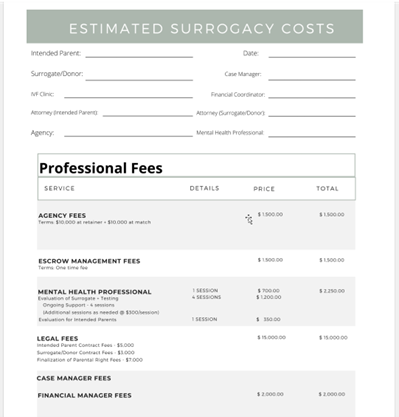In the third part of our series, we now cover the important topic of how much surrogacy will cost. Due to the plethora of information, the focus of this article will be limited to surrogacy agencies in the USA.
Understandably, this is the number one question for most intended parents. Surrogacy is expensive, mainly due to the number of professionals involved, the high risk if something were to go wrong, the high-tech medical processes, and the many people it takes to complete your journey. The overall cost can depend upon which country you elect to do your surrogacy in, the expense and quality of which will vary. The USA appears to have the highest costs, whereas developing countries like Kenya or Mexico will have the lowest. It is, therefore, important to look at all your options but to balance the cost of surrogacy against the risks associated with each country.
When you retain a surrogacy agency in the USA, there are typically several components that you need to consider:
Agency Fees
Agency fees vary significantly depending on the services and type of pre-screening of surrogates offered. These range from approximately $10,000 to $30,000 and exclude additional expenses, such as the cost of achieving a pregnancy and the surrogate’s reimbursements and fees.[1] Usually, an agency fee is paid in two or three installments: 1st is upon retaining the agency, 2nd when matched, and 3rd when the first transfer of the embryo occurs. Some agencies may follow a “no match, no fee” approach, but it is essential to consider that limited pre-screening may be done in such cases. Many agencies charge a fee upon you retaining their services because they have already spent time and money on marketing, recruiting surrogates, and getting those candidates screened. The agency fee should be analyzed, considering the level and depth of pre-screening done on the surrogate[2]. Agencies with experienced staff and more comprehensive pre-screening procedures may require a higher fee to cover the costs associated with skilled personnel and resources. Ultimately, the agency fee should be viewed as an investment in the quality of service and the assurance of a well-screened, reliable surrogate.
[1] A few agencies offer a guaranteed all-inclusive fee typically ranging from $130,000 to $200,000, but these packages are outside the scope of this article.
[2] Prescreening of surrogates is discussed in our article: Why Work with a Surrogacy Agency?

Surrogate Compensation
In the USA, surrogate compensation typically falls between $26,000 to $60,000. The amount of compensation may differ between first-time surrogates, and proven repeat surrogates with a successful track record in surrogacy. Higher rates have become prevalent in the industry as the demand for surrogates currently exceeds the available supply.
When considering selecting a first-time or repeat surrogate, it is worth noting that surrogacy journeys can vary, and both first-time and repeat surrogates may encounter challenges and unexpected situations during the process. For example, medical approval and medication adherence may not significantly differ between first-time and repeat surrogates. Intended parents should also consider the number of pregnancies a repeat surrogate has carried, as a high number can potentially increase the risk associated with the pregnancy. Nevertheless, repeat surrogates offer invaluable knowledge and experience to the intended parent(s). They possess a deep understanding of what to expect emotionally and practically throughout the surrogacy journey,
In addition to the compensation paid to the surrogate, there are other expenses that she can claim:
Lost Wages
Lost wages are typically based on her take-home pay. Most agencies require a letter from the doctor approving the lost wages. However, there can sometimes be grey areas worth clarifying in advance. For example, if a surrogate must stay home because of the flu, is this a chargeable cost to the intended parents, or would she have lost those wages anyway if she were not pregnant? The general thought is that intended parents are responsible for all lost wages from pregnancy onwards. Some agencies will cap the lost wages to a specified amount of money or a specific number of days. This approach, though well-intended, can lead to unintended consequences and potentially jeopardize the health of the pregnancy. For instance, if a pregnant surrogate has used up her available paid time off because her child was ill but is ordered to bed rest by her doctor. She is now faced with balancing financial obligations by ignoring her doctor’s orders and continuing to work so she can buy food and pay bills or prioritize the pregnancy’s well-being and follow the doctor’s orders. Capping lost wages can only lead to an antagonistic relationship between the intended parents and their surrogate. A better solution is to clearly define what lost wages will be paid and what supporting documentation is needed or to buy insurance coverage for lost wages. Some jobs in some States offer disability insurance that could provide coverage for 30-60% of lost wages.
Two additional work-related situations to look at carefully involve the following:
(a) commissions earned and bonuses, and (b) hours worked.
If the surrogate earns a commission on sales over and above her lost wages, will she be paid her lost wages AND commission, and how are they calculated? If the calculation is complex or can lead to an unnecessary dispute, we recommend that the parties agree to a flat fee to cover both. Her hours and days worked should also be carefully looked at. A surrogate may work 40 hours a week, but she might work 12-hour shifts. If a medical appointment or the embryo transfer is scheduled on the 12-hour shift day instead of her day off, the intended parents will pay for 12 hours of lost wages instead of zero. In addition, some jobs might require a person to contractually do a series of back-to-back shifts (e.g., four days of 24-hour shifts, then six days off work), and not doing any part of a shift results in the loss of the entire series of shifts. It is important to discuss unusual shift situations with the agency and detail them clearly in the contract.
Childcare
Although this topic seems straightforward, it can become complicated and costly if not agreed upon beforehand. As a rule, childcare is usually only paid for those occasions when a childcare provider would not usually be hired, e.g., a working surrogate should not claim childcare for the hours that she is generally at work. However, if she is hospitalized, childcare would be covered, but this still needs clarification, e.g., will it be provided only until her partner comes home from work, and will the partner now be responsible for looking after the children as well as getting dinner for the family and the groceries all by themself? You can now see how complicated it can all become, most of which can become contentious if not agreed. Some other things that need to be considered include: – If a family member provides the childcare, should they be paid, and at what rate? What if the family member lives in the same household? If the partner works nightshifts, will childcare be provided 24 hours? It is all about knowing what questions to ask. These questions are quickly answered with a frank discussion with the surrogate and her partner so that the scenarios outlined above are considered well in advance, without issue, and then recorded in the contract.
Travel
Who will arrange the travel, and will the surrogate have input (direct flights vs two stopovers)? Is there a per diem per day of travel? Can she take a travel companion with her? Will the travel companion receive a per diem allowance while traveling and lost wages? Many agencies offer $75 per day per diem for incidentals, including food for each traveler. Travel usually means being away from home for more than 6 hours. This per diem may fluctuate depending on which city she travels to. It would be best if you also decided on the policy concerning hotel accommodation. You should book one with room service, especially if the surrogate travels alone or for an embryo transfer. Should the surrogate book a car, go by taxi, or use an app like Uber or Lift?

Screening Costs
An intended parent should, as a minimum, be informed on what screening costs they will incur if: –
- The surrogate is rejected by the mental health professional, their fertility clinic, or doctor or does not sign her legal contract.
- The surrogate never undergoes an embryo transfer for them.
- All parties agree to work together.
Psychological Services
The agency may have an in-house psychological service, which should be incorporated into their fee. The intended parent should understand the potential costs if an independent professional conducts the service. Some agencies offer access to a mental health professional throughout the pregnancy and for several months beyond the delivery. Typically, these costs are negotiated to around $200-$300 monthly. Alternatively, individual sessions can be booked and are generally billed at about $120-$200 per hour. If the mental health professional services are billed hourly, the intended parent should understand when these services can be requested, by whom, and who oversees these requests. If the services are offered as a monthly fee, confirm that the services are indeed provided to the surrogate, the intended parent, or both, and are there limitations to how often these services can be requested?
Insurance
There are four different types of insurance policies relating to a surrogacy journey:
Medical Health Insurance – this policy will cover pregnancy and delivery only. Unlike socialized medicine, in the USA, independent companies offer various medical insurance policies. Some policies will exclude surrogacy (written in the Explanation of Benefits Booklet), whereas some will specifically cover a surrogate pregnancy. Other policies are intentionally vague or confusing in their wording. Your agency, lawyer, or insurance broker referred to by the agency can help you navigate insurance, particularly in the USA, where such policies are standard.
Additionally, if a surrogate has insurance through her or her partner’s work, the intended parents will not need to pay the monthly insurance premiums. If the surrogate’s insurance excludes a surrogacy pregnancy or she has no adequate insurance, the agency will assist the surrogate in purchasing a policy. In such a case, the intended parents are responsible for the monthly premiums until six months after birth. Premiums vary significantly from state to state. A Californian policy can cost as much as $900 per month, whereas a policy in Oregon could cost $350 per month.
Medical insurance for a newborn. This can become complicated for non-USA residents. Even though a newborn is considered a US citizen, in some states, the newborn is not entitled to insurance coverage. (This is the same situation in all countries that permit surrogacy, including Canada.) However, in some states, the baby is entitled to be covered by the surrogate’s insurance for the first 30 days after birth. In Minnesota, as an example, parental rights vest after birth, and therefore until the parental order is granted, the surrogate’s insurance policy covers the baby’s healthcare needs. There has been talk about securing insurance coverage under the Affordable Care Act. Under this legislation, there may be the option that newborn babies are entitled to healthcare from birth onwards, regardless of the citizenship of their parents. Consult your agency or attorney to understand available newborn insurance policies better.
Life Insurance – it can be mandatory in some states or countries. It is recommended that the intended parents take out a life insurance policy for the surrogate with her family as beneficiary. Some life insurance policies offer a hybrid policy with some money for the surrogate’s family and some for the intended parents. Typically, life insurance policies cost $300-500 per year.
Disability Policy – Many companies offer private or participate-in-state disability insurance, especially in the USA. If a surrogate is eligible to file a claim when she is on restriction from work or for maternity leave, the contract should clearly state that she is obligated to file a claim. The intended parent will pay the difference between her take-home pay and what disability does not contribute. But some jobs do not offer coverage; in California, for example, teachers are not provided with this coverage. A disability policy could become necessary if the surrogate has lengthy hospitalization or long-term bedrest ordered by her doctor.
Legal Fees
There are essentially two types of attorney fees, namely: –
Drafting and finalizing the legal contract between the parties. Contracts are standard in the industry, and attorneys will charge a flat or hourly fee for this work. A flat fee generally saves an intended parent money and is recommended. Attorney fees for this work can range from $3,000 to $6,000, but some attorneys charge more if a court appearance is needed to get the contract pre-approved by the courts.
Most attorneys recommend that the intended parents alter their will and make explicit provisions for the disposition of any remaining embryos. A Reproductive Estate Plan (REP), which protects the rights and interests of the intended parents in case of a legal separation, divorce, legal incapacity, or death, is advised. In addition, the REP will deal with issues such as child inheritance rights if the parent(s) die before parental rights have been finalized. A REP can be expensive ($3,000-8,000); therefore, the intended parents should be confident they will have remaining embryos needing protection.
Finalization of Parental Rights. For non-citizens, an attorney can guide the intended parents in quickly obtaining a passport to enable them to travel home safely with their newborn. This is one of the services intended parents should take their time with. A highly skilled attorney should be retained. The laws of surrogacy seem to be continually in flux, and an attorney with a broad knowledge of the field is needed to combat these fluxes. As an example, Covid-19 saw the closing of most borders resulting in intended parents being unable to be present for the birth of their babies. However, some intended parents could travel to the United States soon after their baby was born, but how was this possible? Simple – some attorneys are experts in the field and found the loopholes needed to enter the USA. When President Trump issued the no-travel order proclamation, there were specific exceptions: “any alien who is the parent or legal guardian of a US citizen who is unmarried and under the age of 21”. A child born in the USA is an American Citizen from birth, and therefore their parent automatically became eligible under this exception. But that was still not enough for the American Consulates. In addition, an attorney obtained a letter from the delivery hospital stating that taking care of this newborn at their facility was overly burdensome to them when they had so many Covid-19 cases to deal with. These two arguments and the parental judgment were sufficient for the intended parents to be granted a visa to enter the US after a 14-day self-quarantine. Most intended parents were advised to self-quarantine for 14 before the expected birth. This was a perfect example of excellent lawyering and endless hours of research. In contrast, less skilled agencies and lawyers saw their clients being denied access to their newborns for months after birth.
Medical Costs
These can differ considerably from medical practice to medical practice. Medical care costs in the USA are higher than in most other countries. Most agencies are invested in their intended parents obtaining pregnancies as quickly as possible. They are, therefore, an excellent resource to work with when selecting a clinic. Some work with one specific clinic only and will have negotiated a lower fee for their intended parents. Other agencies refer to multiple clinics and help the intended parents decide which clinic suits their specific circumstances and needs. For example, only a handful of fertility clinics will accept embryos created outside the USA. It is understandable that if an intended parent has already taken the steps towards creating life, they want to see the finalization of that journey.
Other Considerations & Costs
When you are getting ready to stop reading this complicated and lengthy article, apologies, but there is more to share! There are indeed Other Considerations & Costs that need to be discussed to ensure this Article is comprehensive.

- Travel – Finding a local monitoring facility is advisable if your surrogate lives far from your chosen fertility clinic. The savings in lost wages and travel will be substantial. Discuss these options with the clinic before you finalize your choice of clinic. Some Clinics insist on surrogates traveling to them for every appointment, whereas other clinics are open to seeing your surrogate 2-3 times, and the remaining appointments can be made locally. If the fertility clinic offers an all-inclusive package, this package may include all the monitoring. Make sure you are not paying twice for the same service.
- Embryo Transfer Fee – Some agencies charge a flat fee per embryo transfer, but most do not. Some costs are incurred for additional transfers, such as in vitro fertilization clinical charges, medications, travel, lost wages for the surrogate, and other medical monitoring appointments. However, you need to understand what additional costs the agency incurs when a surrogate needs a further transfer.
- Cesarian Section Fee – Undergoing a cesarian section is a significant and risky procedure, and recovery is frequently difficult. It makes sense that the surrogate should be reimbursed for this additional pain and suffering. However, if the surrogate had a cesarian section for her first pregnancy, having a second one is almost guaranteed. While it is appropriate that the intended parent should pay for expenses such as her recovery, lost wages, and childcare, should the surrogate also receive the additional cesarian section fee?
- Invasive Procedures – This covers an amniocentesis, a fetal reduction or termination, ectopic pregnancy, or loss of the uterus arising from a pregnancy complication. These procedures typically come with additional compensation due to the surrogate in addition to lost wages and childcare.
- Housekeeping – This may be necessary when a surrogate is put on restrictive movement. Although she may have a partner, it is burdensome for that partner to do all the household chores that two people previously shared. Some agencies offer a capped lump sum that the surrogate can use for housekeeping services, whereas others pay for these services based on evaluating the situation.
Packages or Combos
This refers to bundles of services the agency can bring together into one package at a specific price, regardless of whether all the services are used or needed. Frequently, packages/combos/bundles are huge money-saving items, but it is important to read the terms and conditions – yes, all the terms and conditions. For example, one bundle deal offered a money-back guarantee if a live birth was not achieved. However, the small print revealed that the intended parents could not use any existing embryos that resulted in a failed cycle or miscarriage, that the agency chose the surrogate, and that the egg donor had to meet strict criteria. This meant that the intended parents would incur substantial costs in creating a fresh round of embryos instead of using their existing embryos. Of course, it is understandable if the embryos are not of good quality, but if they are genetically tested and approved, why not implant them? The bottom line is that even a package, combo, or bundle must be profitable to all parties; otherwise, why offer it? Every professional is entitled to be paid for their expertise. This is similar to buying insurance; it costs money, but if you ever experience a disaster, you will undoubtedly be happy that you purchased it! If a claim is never made, the only real benefit is knowing you were protected from all eventualities. The onus is on the intended parent to understand the terms and conditions of the bundle.
Some Final Thoughts
Some agencies request that all anticipated funds be deposited into a trust or escrow account before any medication is taken by the surrogate and after legal clearance is issued. This protects the surrogate and her family financially from any problems during the pregnancy. If the intended parents cannot fully fund the trust/escrow account, the surrogate will be responsible for the medical bills since they are in her name. Other agencies request a deposit (usually $50,000) used to pay expenses, and additional funds are requested as needed. Some agencies require an incidental deposit ($20,000) over and above the estimated costs for the surrogacy journey. This incidental deposit is returned to the intended parents once their trust/escrow account is closed, typically six months after birth.
Every agency should provide an estimate of the costs that will be incurred for each surrogacy candidate that is offered for matching. This will ensure that the intended parent is fully aware of all expenses that could be incurred BEFORE agreeing to work with a surrogate. This approach is in the intended parents’ best interest, and this document should be used to draft the terms of the surrogacy contract.
It is not recommended that any intended parent agree to work with a surrogate without having the estimated costs in writing.

Surrogacy costs are undoubtedly significant for intended parents embarking on this life-changing journey. While the financial aspects may seem daunting, it is essential to remember that surrogacy offers a unique and rewarding path to parenthood for many individuals and couples. By thoroughly researching and understanding the various expenses involved, and seeking guidance from experienced professionals, intended parents will find a surrogacy solution that aligns with their budget.
This series of articles: How to Compare Agencies has been divided into 4 Parts:
Part 1: Types of Surrogacy Agencies
Part 2: When the Match Falls Apart
Part 3: Cost Analysis (USA Agencies)
Part 4: Selecting an Agency
Author: Karen Synesiou, Infertility Portal, Inc.


